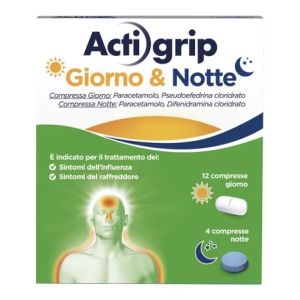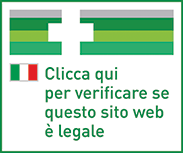Ship in Europe, Find out rates!
Actigrip Day&Night Cold and Flu 12+4 Tablets

- box Delivery in Italy in 24/48 and free returns
- star3.000+ positive reviews
- dropboxOver 60,000 products in the catalog
White and blue colored tablets for oral use containing paracetamol, pseudoephedrine hydrochloride, diphenhydramine hydrochloride.
Therapeutic indications
Actigrip Day & Night is used to treat cold and flu symptoms.
Dosage and posology
Adults and children over 12 years of age: one white tablet three times a day, in the morning, at noon and in the afternoon, plus one blue tablet in the evening before bedtime.
Do not exceed the recommended dose.
Overdose
In the event of an overdose, immediate treatment is essential.
Paracetamol
Despite the absence of early symptoms, gastric lavage is required within 4 hours of taking more than 7.5 g of paracetamol; within 48 hours administration of oral methionine or intravenous N-acetylcysteine is recommended. In the first 24 hours following the overdose the following may occur: pallor, nausea, vomiting, anorexia and abdominal pain; liver damage may become evident after 12 to 48 hours and abnormalities in glucose metabolism and metabolic acidosis may occur. In severe poisoning, liver damage can progress to encephalopathy, coma, and eventually death. Even in the absence of severe liver damage, acute renal damage with tubular necrosis can develop. Liver damage can occur in adults who have taken doses greater than 10 g of paracetamol. In case of overdosing, the paracetamol contained in the Day & Night Actigrip can cause hepatic cytolysis and can evolve towards massive and irreversible necrosis.
Pseudoephedrine
As with other sympathomimetic agents, symptoms of an overdose include irritability, agitation, tremors, convulsions, palpitations, hypertension, difficulty urinating, hallucinations, hypertonicity and hyperreflexia, dilated pupils and hypokalaemia. If necessary, support breathing and control seizures, perform gastric lavage and possibly catheterize the patient. In case of overdose, the pesudoephedrine contained in Actigrip Day & Night can cause stroke. Elimination of pseudoephedrine can be accelerated with acid diuresis or dialysis.
Diphenhydramine
Symptoms of an overdose can include somnolence, hyperpyrexia and anticholinergic effects. With very high doses, and especially in children, symptoms include: excitement, insomnia, nervousness, tremors and epileptic seizures. Following massive overdose, coma or cardiovascular collapse may follow.
Treatment of an overdose is symptomatic and supportive. Measures to promote rapid gastric emptying (such as vomiting or gastric lavage) and, in case of acute poisoning, intake of activated charcoal are helpful. Intravenous administration of physostigmine may antagonize anticholinergic symptoms.
Contraindications
- Hypersensitivity to the active substances or to any of the excipients
- Children under 12
- Known or suspected pregnancy, breastfeeding
- Severe heart failure, cardiovascular disease, hypertension, glaucoma
- Patients with a history of stroke or predisposing risk factors
- Stenosis of the gastro-enteric system. Patients with a history of gastrointestinal bleeding or perforation related to previous active treatments or a history of recurrent peptic ulcer / haemorrhage (two or more distinct episodes of proven ulceration or bleeding)
- Hyperthyroidism, diabetes
- Prostatic hypertrophy, urogenital stenosis
- Asthma
- Patients being treated with monoamine oxidase inhibitors (MAOIs) and in the two weeks following such treatment; patients with a history of seizures, epilepsy
- Furthermore, due to the paracetamol content, Actigrip Day & Night is contraindicated in patients with manifest insufficiency of glucose-6-phosphate dehydrogenase.
Side effects
The following are the side effects, recorded after taking Actigrip Day & Night:
- Very common side effects:
Gastrointestinal disorders: abdominal or stomach pain, dyspepsia, nausea, diarrhea and vomiting, dry mouth and throat.
CNS disorders: headache, drowsiness, sedation, excitement, increased sweating, sleep disturbances.
Visual disturbances: impaired vision. Disorders of the skin and skin adnexa: skin rash, urticaria. Respiratory system disorders: dry nose.
- Common side effects:
Disorders of the skin and skin adnexa: itching, contact dermatitis, inflammation of the skin or mucous membranes.
Cardiac disorders: orthostatic / postural hypotension, arrhythmia, tachycardia.
CNS disorders: nervousness and dizziness, tinnitus, ataxia, euphoria and tremors. Hypotension, decreased mucous secretions.
Visual disturbances: diplopia, impaired vision, glaucoma, closed angle glaucoma.
Gastrointestinal disorders: disorders of the epigastrium. Respiratory system disorders: dyspnoea.
Urinary system disorders: urinary retention. Metabolism and nutrition disorders: hyperamylasemia. Systemic disorders: fatigue, asthenia.
Hepatobiliary disorders: liver function disorders.
- Uncommon side effects:
Skin and skin adnexa disorders: fixed drug eruption (FDE), erythema multiforme, rashes.
Disorders of the urinary system: acute renal failure, interstitial nephritis, hematuria, anuria.
Gastrointestinal disorders: ulcerative stomatitis, constipation, flatulence, peptic ulcers, gastrointestinal perforation or haemorrhage sometimes fatal particularly in the elderly, melaena, haematemesis, exacerbation of colitis and Crohn's disease
Respiratory system disorders: sneezing, dryness of the pharynx and bronchial tree.
Disorders of the skin and skin adnexa: photosensitization. CNS disorders: Central depression, mental confusion, impaired cognitive function
- Rare side effects:
Endocrine disorders: hyperthyroidism. Disorders of the urinary system: renal papillary necrosis.
CNS disorders: hallucinations and nightmares, secondary mania, anxiety, psychiatric disorders, severe headaches. Impaired memory or concentration. Convulsions
Haematological disorders: blood dyscrasias, agranulocytosis, anemia, haemolytic anemia and thrombocytopenia.
Hypersensitivity reactions: anaphylactic shock, edema of the larynx. Hepatobiliary disorders: hepatitis.
Gastrointestinal disorders: gastritis, pancreatitis.
- Very rare side effects:
Haematological disorders: leukopenia, neutropenia, pancytopenia.
Cardiac disorders: heart failure, angina, ST segment increase, myocardial infarction, hypertension, angioedema, edema, Hepatobiliary disorders: hepatotoxicity.
Skin and skin disorders: Bullous reactions including Stevens Johnson Syndrome and toxic epidermal necrolysis.
Hypersensitivity reactions: toxic shock syndrome.
Pregnancy and breastfeeding
The product is contraindicated in case of confirmed and presumed pregnancy, and during lactation.
- Pregnancy
Inhibition of prostaglandin synthesis may affect pregnancy and / or embryo / fetal development. Results of epidemiological studies suggest an increased risk of miscarriage and cardiac malformation and gastroschisis after use of a prostaglandin synthesis inhibitor in early pregnancy. The absolute risk of cardiac malformations increased from less than 1% to approximately 1.5%. The risk was believed to increase with dose and duration of therapy. In animals, administration of prostaglandin synthesis inhibitors has been shown to cause increased pre- and post-implantation loss and embryo-fetal mortality. In addition, an increased incidence of various malformations, including cardiovascular, has been reported in animals given prostaglandin synthesis inhibitors during the organogenetic period. During the third trimester of pregnancy, all prostaglandin synthesis inhibitors can expose the fetus to:
-cardiopulmonary toxicity (with premature closure of the arterial duct and pulmonary hypertension);
-Renal function, which can progress to renal failure with oligo-hydroamines;
the mother and the newborn, at the end of pregnancy, to:
-possible prolongation of bleeding time, and antiplatelet effect which may occur even at very low doses;
-inhibition of uterine contractions resulting in delayed or prolonged labor.
- Feeding time
Paracetamol, pseudoephedrine and diphenhydramine are secreted in breast milk; therefore, Actigrip Day & Night is contraindicated during breastfeeding.
Special warnings
The use of Actigrip Day & Night should be avoided in conjunction with analgesics, antipyretics or other NSAIDs, including selective COX-2 inhibitors. Undesirable effects can be minimized by using the lowest effective dose for the shortest possible duration of treatment needed to control symptoms.
High doses or prolonged administration of the paracetamol, present in the product, or in other drugs containing paracetamol, can cause high-risk liver disease and alterations in the kidney and blood, including severe and severe adverse reactions.
In adults and children over 12 years of age, the total dose of paracetamol should not exceed 4 g per day.
Paracetamol should be administered with caution to patients with mild to moderate hepatocellular insufficiency (including Gilbert's syndrome), severe hepatic insufficiency (Child-Pugh> 9), acute hepatitis, concomitant treatment with drugs that impair liver function, deficiency of glucose-6-phosphate dehydrogenase, haemolytic anemia.
Expiry and retention
Check the expiration date indicated on the package. The expiry date indicated on the package refers to the product in intact packaging, correctly stored.
Warning : do not use the medicine after the expiry date indicated on the package.
Composition
1 white tablet of Actigrip Day & Night contains:
Active principles
Paracetamol 500 mg, pseudoephedrine hydrochloride 60 mg.
Excipients
Microcrystalline cellulose, pregelatinised maize starch, croscarmellose sodium, magnesium stearate, povidone, crospovidone, stearic acid.
1 blue tablet of Actigrip Day & Night contains:
Active principles
Paracetamol 500 mg, diphenhydramine hydrochloride 25 mg.
Excipients
Microcrystalline cellulose, maize starch, sodium starch glycolate, hydroxypropylcellulose, pregelatinised maize starch, croscarmellose sodium, stearic acid, magnesium stearate, hypromellose, propylene glycol, Opaspray M-1F-4315B.


